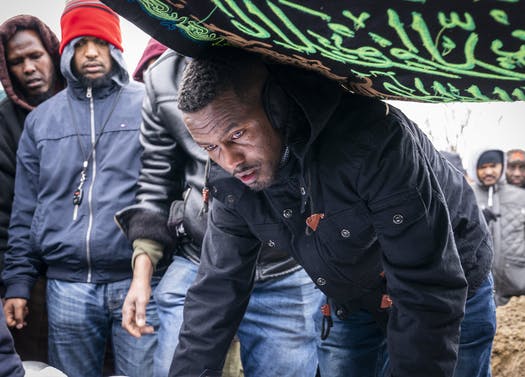The cause of the blaze, thought to be accidental, has not yet been identified.
By Reid Forgrave

Said Harsi, the son of Amatalah Adam, 78, one of five victims of Wednesday’s fire in Minneapolis Cedar-Riverside neighborhood, mourned over her body during her burial Thursday.
The woman stood in the back of the mosque on Thanksgiving morning, here to bury her mother.
The parking lot at the Islamic Institute of Minnesota was overflowing, and so was the inside of the Burnsville mosque. Some 600 people gathered to mourn two of the five people who died early Wednesday in a high-rise apartment fire in Minneapolis’ Cedar-Riverside neighborhood.
The two bodies, both those of Somali-American Muslims, had been bathed on Thursday morning and covered by three white sheets. On top of the sheets rested ornately stitched burial shrouds.
As men washed their feet in a nearby bathroom, Firdaus Aden stood a few steps away from the body of her mother, Nadifa Mohamud, 67. The fire had been a shock. Aden and her mother — “my best friend” — had been talking until the early hours Wednesday morning about a fundraising drive her mother had undertaken for her mosque in Cedar-Riverside, Masjid DarulQuba Cultural Center. But Aden took solace in her faith’s belief that our lives are foreordained, and that only God determines when our ends will come: “It is written,” she whispered. “It is written.”
“On the night of her death, I called her at midnight — I don’t know why,” Aden remembered. “She said, ‘Tell everyone to contribute. We have to help that mosque.’ I promised $100 a month on her behalf, and she was so happy. She always taught me that giving doesn’t depend on having. We were poor, with nothing, and she would give away everything we had in the house.”
A day after the tragic — and, according to preliminary reports, accidental — fire in the 25-story Cedar High Apartments, the Cedar-Riverside neighborhood, as well as the broader Twin Cities Somali-American community, gathered to mourn the dead. Three of the five deceased were Somali-Americans: Mohamud; Amatalah Adam, 79, and Maryan Mohamud, 69. The fourth victim was Jerome Stuart, 59, and the fifth had yet to be identified Thursday evening. All died from smoke inhalation.
In the first-floor community room of the apartment building, rumors spread on the cause of the fire. Some thought it was from a gas stove. One resident, Abdul Gas, who had to sprint down 23 stories to escape the fire, was convinced it had been started by a lit cigarette. He pointed out a piece of butcher paper hanging in the community room. In purple marker, someone had written the words, “I will try not to smoke on November 21st because…”
Regardless of the theories, Minneapolis Fire Chief John Fruetel has said it will take some time to determine the cause.
Early Thursday, before the funeral service, Imam Sharif Abdirahman Mohamed strode up the stairs to his second-floor office in Dar Al-Hijrah Islamic Center in Cedar-Riverside. He wore a sport coat over his blue khamiis, an ankle-length Arab garment, and hundreds of religious texts lined his bookshelves. He’d been up until 1 a.m. meeting with the three families of the deceased.
His mosque is a block away from the high-rise where the fire occurred. Outside, you could see a burnt-out unit on the 14th floor, its windows covered in plywood. He was preparing to preside over Thursday’s services for two of the three Somali-American women killed in the blaze: Nadifa Mohamud and Amatalah Adam.
Adam attended his mosque. The imam described her as gentle and generous with her time; her nickname was “Deeqo,” which he said means generous. She would set up chairs for older congregants at the mosque at Friday prayers. She’d give up her own chair and sit on the floor if an older person needed it.
Mohamed said his role as imam was to counsel that these tragedies are beyond our control. But we can still learn from them, he said, about resiliency, compassion, togetherness. He was struck by those who reached out in the aftermath of Wednesday’s tragedy — not just the Somali community, but the Korean community, churches, the Red Cross. Congregants at the mosque were meeting downstairs to brainstorm ways to raise money for the families to pay for the costs of burial. The nearby Palmer’s Bar hosted a free Thanksgiving potluck for the community. And People’s Center Clinics & Services, which serves the West Bank community, set up an online fundraiser that quickly surpassed its first goal and was headed toward a new one of $100,000 Thursday evening.
“When you compare our civil war, when you compare the life in refugee camps, when you also compare just coming to a country you don’t know and trying to survive — you just compare this to all of those challenges we’re used to,” the imam said. “This one, it’s not an easy one. But all of those experiences taught us to be strong, to help one another, to rely on one another. All of those experiences we had before taught us that in this world, you cannot survive by yourself.”
Later, at the funeral, Firdaus Aden stood near her mother’s body. A funeral director handed her a Ziploc bag with beaded jewelry that her mother had been wearing. The body was about to be brought to the front of the mosque, then taken to the nearby Islamic cemetery for burial. Now, though, Aden thought of her mom — a quiet, humble, religious person — and of the lessons she’d learned from her. What kept sticking in her head was that final conversation, hours before a fire would end her mom’s life. All her mom was focused on was rallying people to give to her mosque.
“That’s what her last wish was,” Aden said. “And that’s what I must do for her.”
Source: StarTribune


